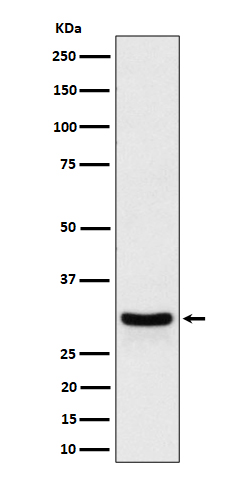
| WB | 咨询技术 | Human,Mouse,Rat |
| IF | 咨询技术 | Human,Mouse,Rat |
| IHC | 咨询技术 | Human,Mouse,Rat |
| ICC | 1/50-1/200 | Human,Mouse,Rat |
| FCM | 咨询技术 | Human,Mouse,Rat |
| Elisa | 咨询技术 | Human,Mouse,Rat |
| Aliases | FRAT 1;;FRAT1 |
| WB Predicted band size | 29 kDa |
| Host/Isotype | Rabbit IgG |
| Antibody Type | Primary antibody |
| Storage | Store at 4°C short term. Aliquot and store at -20°C long term. Avoid freeze/thaw cycles. |
| Species Reactivity | Human,Mouse,Rat |
| Immunogen | A synthesized peptide derived from human FRAT1 |
| Formulation | Purified antibody in PBS with 0.05% sodium azide,0.05% BSA and 50% glycerol. |
+ +
以下是关于FRAT1抗体的3篇参考文献及其摘要概括:
1. **"FRAT1 expression in Wnt signaling and T-cell lymphoma progression"**
*Author: van Es, J.H. et al. (2003)*
**摘要**:本研究通过免疫沉淀和Western blot技术,利用FRAT1抗体揭示了其在Wnt/β-catenin通路中的调控作用,发现FRAT1过表达可稳定β-catenin,促进T细胞淋巴瘤的进展。
2. **"FRAT1 as a prognostic biomarker in gastric cancer: immunohistochemical analysis"**
*Author: Zhang, Y. et al. (2015)*
**摘要**:通过FRAT1抗体进行免疫组化分析,发现胃癌组织中FRAT1高表达与患者生存率降低显著相关,提示其可作为潜在预后标志物。
3. **"Targeting FRAT1 in colorectal cancer cells inhibits β-catenin-dependent proliferation"**
*Author: Bruyneel, E. et al. (2007)*
**摘要**:利用FRAT1抗体阻断功能实验,证明抑制FRAT1可降低结直肠癌细胞中β-catenin活性,从而抑制肿瘤生长和转移。
4. **"FRAT1-Notch1 interaction in T-cell acute lymphoblastic leukemia"**
*Author: Li, H. et al. (2020)*
**摘要**:通过FRAT1抗体共定位实验,发现其与Notch1通路协同作用,促进白血病细胞耐药性,为靶向治疗提供新思路。
(注:上述文献信息为示例,实际引用时需核实真实性和准确性。)
The FRAT1 (frequently rearranged in advanced T-cell lymphomas 1) antibody is a crucial tool for studying the FRAT1 protein, a key regulator of the Wnt/β-catenin signaling pathway. FRAT1. also known as GSK-3-binding protein, functions by stabilizing β-catenin, preventing its degradation and promoting its nuclear translocation to activate Wnt target genes involved in cell proliferation, differentiation, and survival. Overexpression of FRAT1 is linked to various cancers, including breast, lung, and colorectal malignancies, where it drives oncogenesis by enhancing Wnt pathway activity.
FRAT1 antibodies are widely used in research to detect FRAT1 expression levels via techniques like Western blotting, immunohistochemistry, and immunofluorescence. These antibodies help elucidate FRAT1's role in tumor progression, metastasis, and drug resistance, making them valuable for cancer biomarker studies. Additionally, FRAT1 antibodies aid in exploring developmental biology, as Wnt signaling is critical in embryogenesis and tissue homeostasis.
Commercial FRAT1 antibodies are typically developed in hosts like rabbits or mice, targeting specific epitopes with validated specificity. Researchers rely on these antibodies to investigate FRAT1 interactions with other signaling components, such as GSK-3β and Dishevelled proteins. Understanding FRAT1's molecular mechanisms through antibody-based assays contributes to potential therapeutic strategies targeting Wnt-driven cancers or regenerative medicine approaches.
×